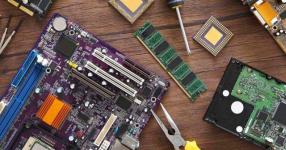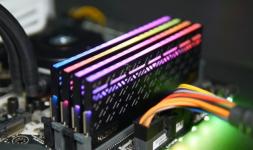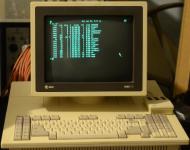Lenovo ThinkBook 16 G7 ARP 21MW
HW: AMD Ryzen 5 7535HS with Radeon Graphics, AMD graphics, memory module(s) 16GB, one drive (Sandisk Corp WD PC SN740 SDDPMQD-512G-1101 512GB), 16.0-inch display.
Kernel: 6.14.0-63.fc42.x86_64
PROBE ID
HW: AMD Ryzen 5 7535HS with Radeon Graphics, AMD graphics, memory module(s) 16GB, one drive (Sandisk Corp WD PC SN740 SDDPMQD-512G-1101 512GB), 16.0-inch display.
Kernel: 6.14.0-63.fc42.x86_64
PROBE ID
DELTA B75M2K V1.0
HW: Intel Core i5-3470 CPU, Intel graphics, memory module(s) 16GB, 2 drives (SAMSUNG HD103SJ 1TB, WDC WD5000LPVX-80V0TT0 500GB).
Kernel: 6.8.0-54-generic
PROBE ID
HW: Intel Core i5-3470 CPU, Intel graphics, memory module(s) 16GB, 2 drives (SAMSUNG HD103SJ 1TB, WDC WD5000LPVX-80V0TT0 500GB).
Kernel: 6.8.0-54-generic
PROBE ID
Acer Nitro AN17-42
HW: AMD Ryzen 7 8845HS w/ Radeon 780M Graphics, AMD + Nvidia graphics, 2 memory modules (2 x Hynix HMCG66AGBSA092N 8GB), 2 drives (SK hynix HFS001TEJ9X125N 1TB, Samsung Electronics Co Ltd MZVLQ1T0HBLB-00B00 1TB), 17.3-inch display and 52 more devices.
Kernel: 6.14.0-desktop-0.rc7.2omv2590
PROBE ID
HW: AMD Ryzen 7 8845HS w/ Radeon 780M Graphics, AMD + Nvidia graphics, 2 memory modules (2 x Hynix HMCG66AGBSA092N 8GB), 2 drives (SK hynix HFS001TEJ9X125N 1TB, Samsung Electronics Co Ltd MZVLQ1T0HBLB-00B00 1TB), 17.3-inch display and 52 more devices.
Kernel: 6.14.0-desktop-0.rc7.2omv2590
PROBE ID
Lenovo 3729 WIN SDK0T76463 3422190805219 (IdeaCentre A340-22IGM F0EA0088US)
HW: Intel Pentium Silver J5040 CPU, Intel graphics, one memory module (Ramaxel RMSA3260ME78HAF-26 8GB), one drive (Seagate ST1000LM035-1RK172 1TB) and 48 more devices.
Kernel: 6.12.1-desktop-1omv2490
PROBE ID
HW: Intel Pentium Silver J5040 CPU, Intel graphics, one memory module (Ramaxel RMSA3260ME78HAF-26 8GB), one drive (Seagate ST1000LM035-1RK172 1TB) and 48 more devices.
Kernel: 6.12.1-desktop-1omv2490
PROBE ID
Hewlett-Packard Compaq 6710b (RM402UT#ABA)
HW: Intel Core 2 Duo CPU T8100, Intel graphics, memory module(s) 2GB, one drive (Gigastone SSD 512GB), 15.4-inch display and 40 more devices.
Kernel: 6.8.0-57-generic
PROBE ID
HW: Intel Core 2 Duo CPU T8100, Intel graphics, memory module(s) 2GB, one drive (Gigastone SSD 512GB), 15.4-inch display and 40 more devices.
Kernel: 6.8.0-57-generic
PROBE ID
MSI Katana 17 B12UDXK
HW: Intel 12th Gen Core i5-12450H, Intel + Nvidia graphics, 2 memory modules (2 x SK Hynix HMCG66AGBSA095N 8GB), one drive (Sandisk Corp WD PC SN560 SDDPNQE-1T00-1032 1TB), 17.3-inch display.
Kernel: 6.12.13-generic-4rosa13-x86_64
PROBE ID
HW: Intel 12th Gen Core i5-12450H, Intel + Nvidia graphics, 2 memory modules (2 x SK Hynix HMCG66AGBSA095N 8GB), one drive (Sandisk Corp WD PC SN560 SDDPNQE-1T00-1032 1TB), 17.3-inch display.
Kernel: 6.12.13-generic-4rosa13-x86_64
PROBE ID
MSI B560M PRO WIFI (MS-7D21)
HW: Intel 11th Gen Core i7-11700, Intel graphics, one memory module (A-DATA Module 32GB), 2 drives (ADATA SU650 480GB SSD, Seagate ST2000DM008-2UB102 2TB).
Kernel: 6.8.0-52-generic
PROBE ID
HW: Intel 11th Gen Core i7-11700, Intel graphics, one memory module (A-DATA Module 32GB), 2 drives (ADATA SU650 480GB SSD, Seagate ST2000DM008-2UB102 2TB).
Kernel: 6.8.0-52-generic
PROBE ID
Did you manage to configure a hardware device that did not work out of the box? Did you find the right driver? The device does not work and you don't know what to do? Write a note about your experience right now in your hardware probe!
Registration is not needed — authorization of your computer is done while creating a probe ...
Registration is not needed — authorization of your computer is done while creating a probe ...
The Linux-Hardware.org database has been divided recently into a set of databases, one per each Linux distro. You can choose your favorite Linux distribution on the front page and hide probes and information collected from other Linux distributions.
Anyone can contribute to the database with the help of the hw-probe command:
hw-probe -all -upload
Hardware failures are highlighted in the collected logs (important SMART attributes, errors in dmesg and xorg.log, etc.). Also it's handy to search for particular hardware configurations in the community and review errors in logs to check operability of devices on board (for some devices this is done automatically by hw-probe — see statuses of devices in your probe).
Hardware stats and raw data are dumped to several GitHub repositories.
Thanks to all for attention and new computer probes!
Anyone can contribute to the database with the help of the hw-probe command:
hw-probe -all -upload
Hardware failures are highlighted in the collected logs (important SMART attributes, errors in dmesg and xorg.log, etc.). Also it's handy to search for particular hardware configurations in the community and review errors in logs to check operability of devices on board (for some devices this is done automatically by hw-probe — see statuses of devices in your probe).
Hardware stats and raw data are dumped to several GitHub repositories.
Thanks to all for attention and new computer probes!
We've implemented automated operability checks for devices via analysis of collected system logs in probes. We check if the driver is loaded and used for each device in the probe and if the device performs basic functions. For network cards we check received packets, for graphics cards we check absence of critical errors in the Xorg log and dmesg, for drives we check S.M.A.R.T. test results, for monitors we check the EDID and for batteries we check the remaining capacity ...
The largest open repository of monitor characteristics has been created recently containing EDID structures for more than 9000 monitors.
EDID (Extended Display Identification Data) is a metadata format for display devices to describe their capabilities to a video source. The data format is defined by a standard published by VESA. EDID data structure includes manufacturer name and serial number, product type, phosphor or filter type, timings supported by the display, display size, luminance data and (for digital displays only) pixel mapping data.
The most famous analogue of the repository is the EDID.tv project, which also contains quite a lot of information about monitors.
The repository is replenished automatically based on recent hardware probes. One can participate in the replenishment of the repository by executing of one simple command in the terminal:
hw-probe -all -upload
The hw-probe utility is pre-installed in the ROSA Linux distribution.
EDID (Extended Display Identification Data) is a metadata format for display devices to describe their capabilities to a video source. The data format is defined by a standard published by VESA. EDID data structure includes manufacturer name and serial number, product type, phosphor or filter type, timings supported by the display, display size, luminance data and (for digital displays only) pixel mapping data.
The most famous analogue of the repository is the EDID.tv project, which also contains quite a lot of information about monitors.
The repository is replenished automatically based on recent hardware probes. One can participate in the replenishment of the repository by executing of one simple command in the terminal:
hw-probe -all -upload
The hw-probe utility is pre-installed in the ROSA Linux distribution.
Friends, I'd like to introduce new hw-probe 1.4.
Most significant change in this release is the anonymization of probes on the client-side. Previously "private data" (like IPs, MACs, serials, hostname, username, etc.) was removed on the server-side. But now you do not have to worry how server will handle your "private data", since it's not uploaded at all. You can now upload probes from any computers and servers w/o the risk of security leak.
The update is available in repositories.
Other changes:
• Up to 3 times faster probing of hardware
• Collect SMART info from drives connected by USB
• Initial support for probing drives in MegaRAID
• Improved detection of LCD monitors and drives
• Collect info about MMC controllers
• Probe for mcelog and cpuid
• Etc.
You can, as before, create a probe of your computer via the application in SimpleWelcome menu or from the console by a simple command:
hw-probe -all -upload
Thanks to all for attention and new probes of computers!
Most significant change in this release is the anonymization of probes on the client-side. Previously "private data" (like IPs, MACs, serials, hostname, username, etc.) was removed on the server-side. But now you do not have to worry how server will handle your "private data", since it's not uploaded at all. You can now upload probes from any computers and servers w/o the risk of security leak.
The update is available in repositories.
Other changes:
• Up to 3 times faster probing of hardware
• Collect SMART info from drives connected by USB
• Initial support for probing drives in MegaRAID
• Improved detection of LCD monitors and drives
• Collect info about MMC controllers
• Probe for mcelog and cpuid
• Etc.
You can, as before, create a probe of your computer via the application in SimpleWelcome menu or from the console by a simple command:
hw-probe -all -upload
Thanks to all for attention and new probes of computers!






